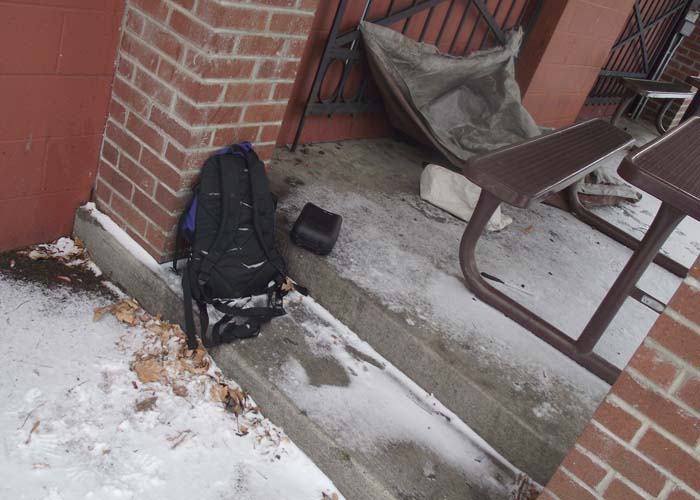La Grande City Council to discuss placing limits for camping on public property
Published 1:00 pm Saturday, November 12, 2022

- Max Square, in downtown La Grande, shows signs of an overnight visitor on a cold December morning in 2019.
LA GRANDE — The La Grande City Council will meet for a work session on Monday, Nov. 14, to discuss proposed ordinance that would restrict camping on public property.
The Camping on Public Property Ordinance would impose time, place and manner restrictions on camping and leaving belongings unattended within certain areas of the city. It would be unlawful to camp at any time within all parks, on sidewalks less than 5 feet wide and on all public property within the commercial historic district. From the hours of 7-9 p.m., it would be against the law to camp or leave belongings on any public property.
Violations would be a Type 1 violation under the city’s Enforcement Ordinance, which comes with a $500 mandatory minimum fine. Each day a violation occurs would be considered a separate offense.
The proposed ordinance is meant to balance the needs and legal protections guaranteed to individuals or families experiencing homelessness while limiting the impacts to the other residents of the city.
The city manager would be able to temporarily suspend the ordinance if needed in the event of an emergency or for a special event permit.
Parks and Recreation Director Stu Spence and La Grande Police Chief Gary Bell will also be in attendance at the work session.
Legal protections
Robinson v. California — a 1962 Supreme Court case — prohibits the state from punishing a person for involuntary acts or conditions if it is an unavoidable consequence of a person’s status or being. In Martin v. Boise — a 2018 9th Circuit Court of Appeals case — the court interpreted Robinson v. California to mean that a governmental entity cannot criminalize unavoidable consequences of being homeless, such as sitting, lying down or sleeping outside. The Supreme Court declined to hear Martin v. Boise, meaning the case is law within the 9th Circuit, which includes Oregon. The Martin case does allow cities to impose reasonable restrictions limiting sitting, sleeping and lying in public places.
In an opinion issued by an Oregon federal district court — Blake v. Grants Pass — the court declared that any prohibition punishing someone for unavoidable consequences of being homeless was unconstitutional. The decision also ensures that if a person experiencing homelessness must sleep outside, they are entitled to take necessary minimal measures to keep themselves warm and dry while sleeping. Lastly the court ruled that a person does not have access to shelter if:
- They cannot access the shelter due to gender, age, disability or familial status
- Accessing the shelter requires them to submit themselves to religious teachings they do not believe
- Accessing the shelter is prohibited because they are under the influence
- They have exceeded a durational limit at a shelter
The Oregon Legislature introduced two House bills in 2021 that afforded additional protections to people experiencing homelessness.
House Bill 3115 requires that any city or county law that regulates sitting, lying, sleeping or keeping warm and dry outside on public property must be objectively reasonable. House Bill 3124 creates guidelines for how cities provide notice to unhoused people about camp closures and how to handle removal of personal items from public property. Under this house bill a city is required to provide 72 hours notice before removing an established camp and must keep items that have apparent value or utility for at least 30 days.
The La Grande City Council must incorporate these legal precedents into any ordinance restricting camping in public spaces.
The La Grande City Council Nov. 14 work session begins at 6 p.m. and will be streamed live on the city’s Facebook page.
Work sessions are open to the public, but there is not typically time set aside for comments or questions from residents. Work sessions provide the city council an opportunity to informally speak about issues, exchange ideas with staff and identify any additional information the council needs prior to an official discussion at a council meeting. The council cannot make decisions at work sessions.





